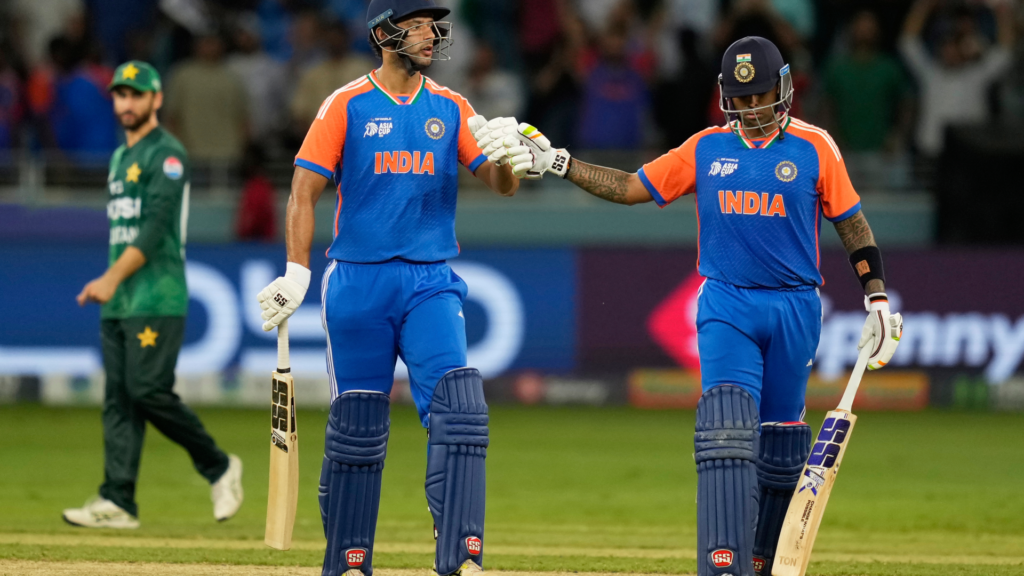India Pakistan Asia Cup handshake controversy took center stage following a highly charged match between the two cricketing nations during the Asia Cup 2025. India, led by captain Suryakumar Yadav, secured a decisive seven-wicket win over Pakistan at the Dubai International Cricket Stadium. While the on-field performance showcased India’s cricketing prowess, the post-match events sparked significant debate and international attention.
The controversy arose when the Indian team chose to forgo the customary post-match handshake with the Pakistani team. Traditionally, such handshakes are a gesture of sportsmanship and mutual respect, transcending political and historical differences. However, this time, the Indian players’ decision to skip the handshake ignited conversations about the intersection of sports, politics, and national sentiment.
The Match Overview
The Asia Cup encounter was one of the most anticipated matches of the tournament, drawing global attention. Both teams entered the stadium with intense preparation and high expectations, knowing that matches between India and Pakistan carry immense emotional and historical weight.

Pakistan batted first and managed a modest total of 127/9. India’s bowlers displayed tactical brilliance, consistently applying pressure and making key breakthroughs at critical moments. Kuldeep Yadav emerged as the standout bowler, claiming three crucial wickets while maintaining a tight economy rate. Pakistan’s batting line-up struggled against disciplined Indian bowling, failing to build partnerships that could have shifted momentum in their favor.
In response, India chased the total confidently. Suryakumar Yadav, the Indian captain, led by example with an unbeaten 47 runs. Supported by consistent batting from the middle order, India achieved a seven-wicket victory with several overs to spare. The win further strengthened India’s position in the Asia Cup standings and demonstrated the team’s ability to perform under pressure.

Despite the on-field triumph, attention quickly shifted to what happened after the final delivery. The customary post-match handshake, a long-standing tradition in cricket, did not occur. Instead, the Indian team headed directly to the dressing room, leaving the Pakistani players and officials waiting on the field. Pakistan’s captain, Salman Ali Agha, did not attend the presentation ceremony, reportedly expressing disappointment at the absence of the traditional gesture.
Suryakumar Yadav’s Explanation
Following the match, Suryakumar Yadav addressed the controversy, clarifying the rationale behind the Indian team’s decision. He explained that the choice to skip the handshake was not a personal or arbitrary one but aligned with directives from the Indian government and the Board of Control for Cricket in India (BCCI).
Suryakumar emphasized that the Indian team’s actions were in solidarity with the victims of a recent terror attack in Pahalgam, Jammu and Kashmir, which resulted in the loss of civilian lives. The captain also highlighted the ongoing military operation, Operation Sindoor, which targeted terrorist camps across the border. He stated that the team’s decision reflected a broader sense of national sentiment and was meant as a respectful acknowledgment of the sacrifices made by the armed forces.
While acknowledging the value of sportsmanship, Suryakumar noted that “few things in life are ahead of sportsman spirit,” implying that certain national and emotional considerations can take precedence over traditional cricketing norms. He reinforced that the Indian players were united in their approach and acted in accordance with government and BCCI guidance.
Reactions and Responses
The Indian team’s decision generated mixed reactions across cricketing communities and among fans. In Pakistan, the choice to avoid the handshake was perceived as a breach of cricketing etiquette and sportsmanship. Officials and players expressed disappointment, noting that the handshake is an essential symbol of respect regardless of political or national tensions.
On the other hand, many within India supported the decision, interpreting it as a statement of solidarity with victims of recent terror attacks and as recognition of the sacrifices of the nation’s armed forces. The debate sparked discussions on whether sports and politics should be kept separate or whether national sentiment should influence on-field conduct.
Within the cricketing community, some analysts argued that such gestures, though symbolic, carry immense diplomatic weight. Matches between India and Pakistan have always been more than just cricket; they reflect broader political and social narratives. Therefore, every action on and off the field can be interpreted through a lens that extends beyond sports.

Historical Context
To fully understand the implications of India Pakistan Asia Cup handshake controversy, it is essential to examine the historical context of India-Pakistan cricketing relations. Matches between the two nations have always been intensely followed, often symbolizing political and cultural narratives as much as athletic competition.
Since their first encounter in 1952, India and Pakistan have shared a complex cricketing rivalry. While there have been moments of friendship and sportsmanship, political tensions and conflicts have repeatedly influenced interactions between teams. Major incidents, such as cross-border conflicts, terrorism, and diplomatic standoffs, have periodically shaped the way matches are played and the conduct of players on the field.
In this context, the decision by Suryakumar Yadav and the Indian team aligns with historical precedents where national sentiment occasionally influenced sporting conduct. However, each incident is unique, reflecting the circumstances of the moment and the broader socio-political climate.
The Role of Sportsmanship
Sportsmanship is widely regarded as a cornerstone of cricket, symbolized by gestures such as handshakes, applause for the opponent, and respectful conduct after matches. The handshake, in particular, conveys mutual respect, acknowledgment of effort, and a commitment to the spirit of the game.
In India Pakistan Asia Cup handshake controversy, the absence of a handshake has prompted discussions about whether sportsmanship should be flexible in light of political and emotional considerations. Supporters of the Indian team argue that national sentiment can sometimes supersede sporting etiquette, especially in the wake of tragic events that deeply affect the nation. Critics, however, argue that sports offer a unique opportunity to demonstrate values such as respect, tolerance, and unity, even amid political tensions.
Broader Implications
The controversy carries broader implications for cricket and international sports. It highlights the challenges faced by teams competing in high-stakes environments where national and political considerations intersect with athletic competition. Such incidents can influence how teams interact in future tournaments and may affect the perception of cricket as a unifying force in the region.
Moreover, the debate underscores the increasing scrutiny that athletes face in the age of social media and global news coverage. Every gesture, decision, and action is observed, analyzed, and interpreted by fans, media, and political observers alike. Teams must navigate the delicate balance between personal and national values while maintaining professionalism on the field.

Moving Forward
As the Asia Cup progresses, the India Pakistan Asia Cup handshake controversy is likely to remain a topic of discussion. Analysts predict that future encounters between the two nations may be influenced by this incident, with players and officials taking careful steps to manage both sportsmanship and national sentiment.
For Suryakumar Yadav and the Indian team, the priority remains consistent performance on the field and representing the country with pride. By explaining their decision publicly, the team has provided transparency while reinforcing that their actions were not intended to disrespect the opponent but to reflect national values.
For cricket fans, the incident serves as a reminder of the complex interplay between sports, politics, and culture. It highlights how matches between India and Pakistan are never merely athletic contests but events laden with historical, emotional, and political significance.
Conclusion
India Pakistan Asia Cup handshake controversy is a defining moment in the 2025 Asia Cup, illustrating the delicate balance between sportsmanship and national sentiment. The Indian team’s decision to skip the handshake, explained by captain Suryakumar Yadav, reflects solidarity with victims of recent events and alignment with national directives.
While reactions vary, the incident offers valuable lessons about the power of cricket to convey messages beyond the boundaries of the game. It underscores the fact that sports, particularly high-profile matches between nations with complex histories, often serve as a stage for broader social and political narratives.
As the tournament continues, the cricketing world will watch closely to see how this incident shapes future encounters, team conduct, and fan expectations. For now, India’s victory on the field remains undisputed, but the post-match discussion serves as a reminder that cricket is much more than runs, wickets, and trophies—it is also about values, respect, and the stories that transcend the game itself.
Do follow UAE Stories on Instagram
Read Next – Abu Dhabi and Amazon Launch World’s Largest Arabic Digital Library












